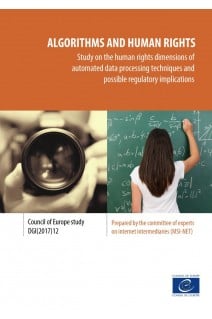



In our increasingly digital world, algorithms are everywhere and rule our lives. How can humans ensure they stay in control?
This study identifies a number of human rights concerns triggered by the increasing role of algorithms in decision-making. Depending on the types of functions performed by algorithms and the level of abstraction and complexity of the automated processing that is used, their impact on the exercise of human rights will vary.
Who is responsible when human rights are infringed based on algorithmically-prepared decisions? The person who programmed the algorithm, the operator of the algorithm, or the human being who implemented the decision?
Is there a difference between such a decision and a human-made decision?
The expert study examines the effects of the use of algorithms on the way in which human rights are exercised and guaranteed in accordance with well-established human rights standards, including rule of law principles and judiciary processes.
COMPOSITION OF THE MSI-NET
I. INTRODUCTION
II. THE SCOPE OF THE STUDY
1. AUTOMATION
2. DATA ANALYSIS
3. ADAPTABILITY
4. SOCIAL CONSTRUCTS AROUND ALGORITHMS
III. IMPACTS OF ALGORITHMS ON HUMAN RIGHTS
1. FAIR TRIAL AND DUE PROCESS
2. PRIVACY AND DATA PROTECTION
3. FREEDOM OF EXPRESSION
4. FREEDOM OF ASSEMBLY AND ASSOCIATION
5. EFFECTIVE REMEDY
6. PROHIBITION OF DISCRIMINATION
7. SOCIAL RIGHTS AND ACCESS TO PUBLIC SERVICES
8. THE RIGHT TO FREE ELECTIONS
9. OTHER POSSIBLE IMPACTS
IV. REGULATORY IMPLICATIONS OF THE USE OF AUTOMATED DATA PROCESSING TECHNIQUES AND ALGORITHMS
1. TRANSPARENCY
2. ACCOUNTABILITY
3. ETHICAL FRAMEWORKS AND IMPROVED RISK ASSESSMENT
V. MAIN FINDINGS AND CONCLUSIONS
BIBLIOGRAPHY
REFERENCES

In our increasingly digital world, algorithms are everywhere and rule our lives. How can humans ensure they stay in control?
This study identifies a number of human rights concerns triggered by the increasing role of algorithms in decision-making. Depending on the types of functions performed by algorithms and the level of abstraction and complexity of the automated processing that is used, their impact on the exercise of human rights will vary.
Who is responsible when human rights are infringed based on algorithmically-prepared decisions? The person who programmed the algorithm, the operator of the algorithm, or the human being who implemented the decision?
Is there a difference between such a decision and a human-made decision?
The expert study examines the effects of the use of algorithms on the way in which human rights are exercised and guaranteed in accordance with well-established human rights standards, including rule of law principles and judiciary processes.
